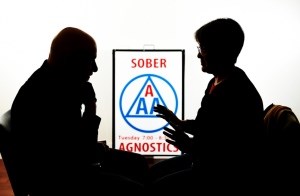As the scope of closures due to the COVID-19 pandemic grinds public gatherings to a halt, some of the most vulnerable people in the region are feeling the effects.
Alcoholics Anonymous (AA), an organization that often relies on the personal support networks that come from person-to-person contact, has shut down many of its gatherings across the Lower Mainland — and this comes at a time when people may need more support due to the social, emotional and financial challenges associated with isolation.
In Metro Vancouver's Tri-Cities alone, AA normally has eight face-to-face meetings in Port Coquitlam, three in Port Moody and 18 in Coquitlam.
But as of the morning of March 20, the organization’s Vancouver AA meeting schedule notes that, in the Tri-Cities, seven face-to-face meetings have been officially suspended, 15 are scheduled to go ahead and a further 13 have opted to hold virtual meetings.
“The online community is becoming a huge, huge community,” said one local member of Alcoholics Anonymous who, requested to have her name withheld from publication.
The group released a press release from its North American headquarters in New York — now shut down as part of the city’s lockdown — earlier this week in response to the COVID-19 outbreak, echoing the move to virtual meetings across Canada and the U.S.
The group’s members have begun to meet online through Zoom, Google Hangouts or conference calls as an alternative to face-to-face meetings, and that has helped maintain “focus on our common welfare and primary purpose,” noted the press release from the organization’s office for Canada and the U.S.
The letter suggests members contact local health authorities for more information. Meanwhile, some groups have changed customs at their face-to-face meetings; many now avoid shaking and holding hands, and have taken to sanitizing hospitality tables or suspending the serving of food altogether.
“Regardless of group decisions, each individual is responsible for their own health decisions,” wrote AA in the press release.
The move towards virtual meetings comes at a time when many have turned to the group for support.
The anonymous member who spoke to The Tri-City News said the COVID-19 outbreak has led to a massive uptick in the number of calls the organization receives. Part of that results from people’s worlds being flipped upside down and turning to alcohol for comfort.
But some potential new members are people who didn’t know they were alcoholics until bars started closing because of the outbreak.
“We have new members calling every day,” added the local AA member.
Still, she said, fellow AA members have weathered tough times before, and just being part of the group means they are doing everything they can to not be a drain on society.
“We’re responsible members of society. We’ve been an undisciplined lot in the past but we’re trying to be better all the time,” she said. “We try to be as respectful and responsible.
“Our traditions will hold us together. We’re really good at going underground.”
“Zoom us. Email us. Phone us.”
Read more from the Tri-City News



